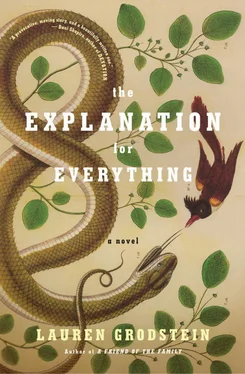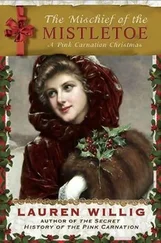He said, “Don’t be ridiculous.” He said, “Only children need something besides life itself to give life meaning. Children, or depressives.”
I asked him if he thought I was depressive.
“Well,” he said, “well, Anita, sometimes I do worry.”
They gave me my check. I wore my new raincoat. I went back to school and to Henry’s lab but the more I learned, the more I despaired.
Henry noticed I was sad and tried to cheer me up the best way he knew how. He took me to fancy restaurants even though I don’t really like restaurants and prodded me to spend more time in the lab even when I didn’t feel like it. Because I didn’t have anything else to do, I’d go back to the lab. Sometimes I’d spend late nights engaged in the riddles of my research, and I’d almost feel enthusiasm, before I remembered what it was I was proving, and then, again, I’d despair.
And then I met Charles, who said to me, “If you need joy in your life, why don’t you come to the one place you’ll find it?” He said, “Just listen to me preach, and if you don’t feel true joy I’ll keep bringing you back until you do.” I had nothing to lose. I listened to him preach that very first night. We walked into the sweaty humid Dallas night on the river near the Holiday Inn, and I sat down on a bench, and I listened to Charles preach just to me. He told me: “God loves you.” He told me: “God is waiting to see you at home again, when our work on this Earth is done.” He told me that the noble life is more than winning awards. He told me that the true good life is something a person knows only when she lets Jesus into her heart.
I felt hopeful for the first time in my memory. I spent that night with Charles, reading the Bible, and praying. And in the morning I felt happy.
I knew I was hurting Henry—I knew I was driving him crazy, even—but I couldn’t help the fact that Jesus had found a home in my heart. My world had purpose now, and that purpose was not in a lab, and it was not in a virus. In fact, now my purpose was to stop my viral research from ever happening. I was the only one who could perform the research, so I was the one who could end it. Right then, I ended it.
I wanted to explain all this to Charles, but I never got the chance. He accused me of faking it, of faking who I really was, of setting him up to look like a thief and a fool. He told me he never wanted to see me again. Charles is a man of his word, so I believed him when he told me this. And although he is the best man I have ever known, he is still only a man, and therefore capable only of man’s flawed mercy—if he were ever to show me any mercy at all. But God’s mercy is perfect and perpetual. When my life is over (I guess now my life is over) I look forward to spending eternity in his shining light, under the cloak of his forgiveness.
I hope you can forgive me too.
I loved you all as best I could.
Sincerely,
Anita
Now that Andy had admitted it to Lionel, he could admit it to anyone who asked. He would no longer teach There Is No God. He would teach evolution, but he would teach it with the essential truth in mind: God got this whole ball rolling.
It wasn’t that he found faith, necessarily, as much as he seemed to have rediscovered something he lost a long time ago, before he’d begun to form memories. How else to explain the comfort it gave him, and the feeling of retrieval? Lionel was right—he was a lucky man. Every small moment in his day started to make sense again, in the same way these moments had made sense to him when he was a child. A neon sunset, a perfect tonal chord at the end of a piece of music, the way his daughters’ careless gestures reminded him of his own and their mother’s. There was meaning in these things now, or there was again.
“Does this mean we have to start going to church?” Belle asked before dinner one night, when Andy suggested they bow their heads for a moment in gratitude for the meal they were about to eat. Rachel had cooked spaghetti with turkey meatballs and Belle had made a salad and Andy was so grateful for all of it, so filled with appreciation for the blessings in his life. Before God, he would have felt gratitude, perhaps, but mostly absence. He’d thought it had been Lou’s absence. Maybe it had been something more.
“I don’t know,” Andy said. “I was thinking maybe we could try it out.”
“I don’t want to,” Rachel said.
“I do,” Belle said. “Everybody goes to church.”
“Church is boring.”
“How do you know?” Belle asked. “You’ve never been.”
“I just do.”
“Actually you don’t know everything,” Belle said. “Not to, like, shock you or anything.”
Andy sprinkled parmesan cheese on his spaghetti. Rachel really was turning into an excellent cook—she’d used garlic in the sauce, and two kinds of olives. “I haven’t decided on anything in particular,” he said. “Except that there should be a little room for God in our lives.”
“Yeah, but why?” Rachel asked. “CCD is supposed to be the most boring thing in the world, by the way. I always felt really lucky that I didn’t have to go to CCD.”
“We’re not Catholic,” Andy said.
“Fine,” said Rachel. “Then what are we?”
“Do we have to be something?” Andy asked. “Can’t we just be generic believers?”
“I don’t even know what that means,” said Belle. She picked up a forkful of spaghetti.
“Is this because of Melissa?” Rachel asked. “Since she believes in Jesus now we do too?”
“Is Melissa your girlfriend?” Belle asked.
“No!” Andy said, reflexively. His relationship with Melissa was so amorphous. How could his daughters have picked up on it? But of course his daughters, maybe all daughters, were perceptive. Maybe they’d sensed her in the house the few times she’d come over late at night. Maybe they’d sensed how eagerly he wanted to talk about her.
“But Melissa believes in God,” Rachel said. “She told me all about her church in Hollyville.”
“That’s true,” Andy said. “And certainly some of the books Melissa gave me have opened my eyes a little, and certainly talking to her has—but no, I don’t believe because Melissa believes. And you guys don’t have to believe just because I do. I just know that ever since I’ve accepted the possibility of God I’ve felt happier. More secure. And I want the same for you.”
The girls were quiet. Belle slurped her spaghetti, and drops of tomato sauce splashed on her shirt.
“Were you not happy before?” she asked, through a mouthful of food.
“I was,” Andy said. “But I missed your mom so much that sometimes it was hard to think about anything else.”
“Don’t you still miss her though?”
“Of course, honey. I’ll always miss her.”
The girls went quiet. The quiet lasted eerily throughout dinner, throughout dishes, and toward bedtime. He tucked them both in and kissed them each on their forehead, and later, when he went to check on them, just to make sure they were warm and their covers hadn’t slipped off, he found Belle in Rachel’s bed, and Rachel on the floor. Belle’s arm hung off the side, and her hand dangled toward her sister. He adjusted her arm; she murmured, annoyed, and rolled over. Andy placed a pillow under Rachel’s head, tucked a blanket under her shoulders. Rachel mumbled something in her sleep that sounded like “thank you.”
The nights were starting to grow perceptibly shorter; it was the second week in March already. Andy settled himself in front of his computer to poke aimlessly around the Internet, see if Melissa had written. She hadn’t, and Andy felt a momentary loss, but he quickly recovered himself. He turned on NPR, sat in the den with a book he’d taken out from the library, essays about the afterlife by C. S. Lewis. It still bothered him that he couldn’t get in touch with Rosenblum. The Internet told him nothing.
Читать дальше












